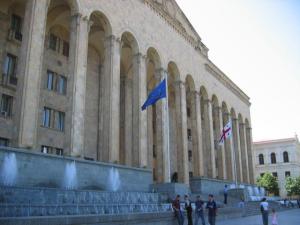The leading Brussels think tank, The European Policy Centre (EPC), on 19 September hosted a round table discussion on the Georgian elections with the participation of Georgian politicians, and representatives from European institutions and civil society. The well attended event was chaired by Amanda Paul, Senior Analyst at the EPC.
The different views of the Georgian political spectrum were presented by Giorgi Kandelaki, Deputy Chairman of the Foreign Affairs Committee of the Georgian Parliament and an activist of the United National Movement who gave a spirited, somewhat aggressive presentation, whilst the opposition view was presented by a more statesmanlike presentation by Tedo Japaridze, Georgia former Foreign Minister and currently International Secretary of the Georgian Dream coalition.
The European perspective was given by the Estonian Ambassador to the EU Matti Maasikas, Polish MEP Krzysztof Lisek, Jacqueline Hale, a senior policy analyst at the Open Society Institute in Brussels and Dennis Sammut, Executive Director of LINKS, the London based think tank. More…







